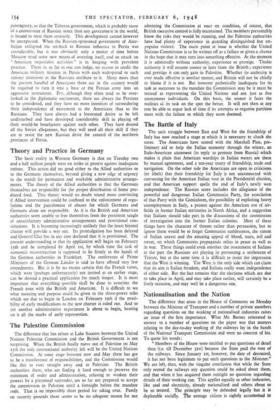The Battle of Italy •
The tacit struggle between East and West for the friendship of Italy has now reached a stage at which it is necessary to check the score. The Americans have scored with the Marshall Plan, pre- liminary aid to help the Italian economy through the winter, an halo-American statement (in reply to protests from Russia) :which makes it plain that American warships in Italian waters are there by mutual agreement, and a ten-year treaty of friendship, trade and navigation. On the other side the Americans are, open to criticisms (or libels) that their friendship for Italy is not unconnected with canvassing for the American Italian vote in the Presidential election, and that American support spells the end of Italy's newly won independence. The Russian score includes the allegiance of the powerful and dangerous Italian Communist Party, the association of that Party with the Cominform, the possibility of exploiting heavy unemployment in Italy, a protest against the American use of air- fields in former Italian territories in North Africa, and a suggestion that Italians should take part in the discussions of the commission of investigation into the former Italian colonies. Most of these things have the character of threats rather than persuasion, but to ignore them would be to forget Communist ruthlessness, the extent of Italian unrest and the amazing appeal of blood, tears, toil and sweat, on which CommUnist propaganda relies in peace as well as in war. These things could even smother the resentment of Italians at the part the Russians are playing in preventing a settlement of Trieste, but at the same time it is difficult to resist the impression that the West is winning. The West is the only side which can claim that its aim is Italian freedom, and Italians really want independence of either side. But the fact remains that the elections which are due to take place in April, and may take place earlier, will certainly be a lively occasion, and may well be a dangerous one.






























 Previous page
Previous page